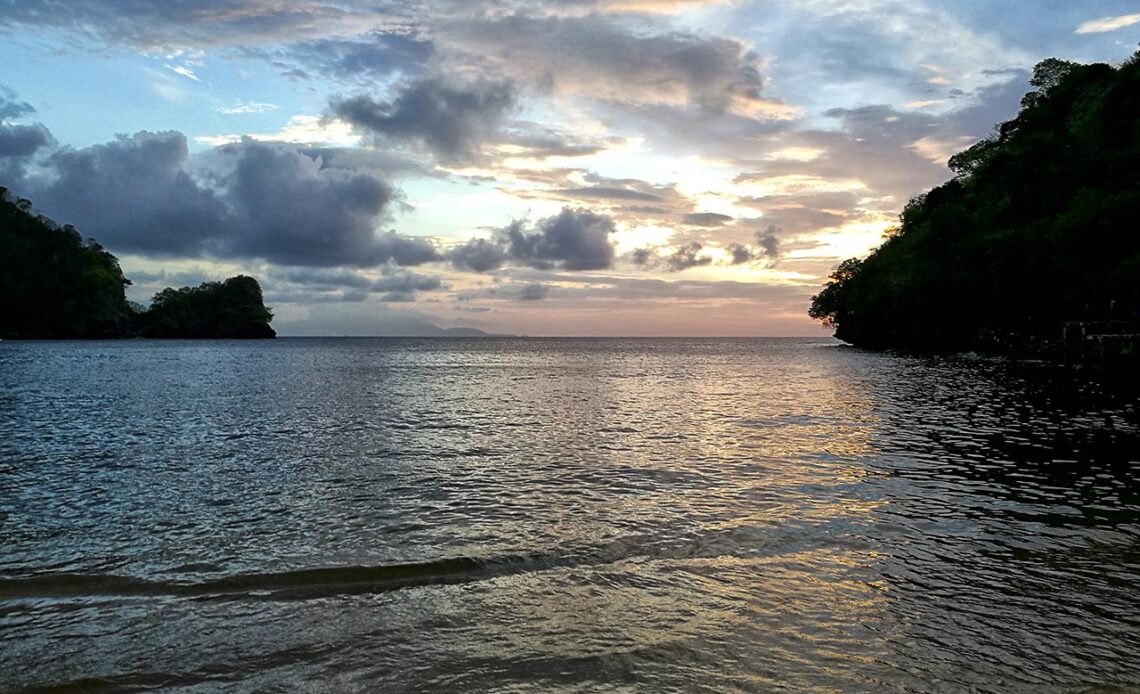
Above: Macqueripe Bay. Photo by Mark Lyndersay.
Caribbean nations are still struggling to find their place in an increasingly global world. One in five Caribean citizens remain below the poverty line, growth is almost 3% lower than the global average, and the region is the 2nd most at risk from environmental hazards due to climate change.
The impact from COVID-19 has made progress more complex. Some business sectors have surged during the pandemic. These include e-commerce and online learning, as well as business and finance sites. But the Caribbean nations have not noticeably benefitted from these trends.
The challenges are significant but there is a solution. It lies in Caribbean nations nurturing a “Blue Economy.” This could have an impact far beyond local governance and encourage international investors to boost direct investment.
What is the Blue Economy and why is it important to the Caribbean?
There are a number of definitions for the Blue Economy, but they all follow a key theme: the sustainable use of ocean resources to improve economic growth while protecting the oceans themselves. This can take the form of sustainable fishing, tourism, or even offshore oil and gas production.
This development can’t come quickly enough. The mounting challenges posed by climate change risk tipping Carribean nations over the edge. In the Bahamas alone Hurricane Dorian caused $3.4 billion in damages. And these kinds of major weather events are expected to accelerate as climate change worsens.
The COVID-19 pandemic has created even bigger challenges. Tourism is one of the region’s biggest employers, contributing around $57 billion annually to Caribbean economies. The lockdown measures imposed during the pandemic are predicted to reduce tourism globally by 58%-78%, which could cause major employment problems in the region.
In order to meet these rising challenges the Caribbean needs to drastically change its way of thinking. At the moment, most Caribbean countries view themselves as small island nations, which undercuts their potential.
At more than 2,754,000 km2 (1,063,000 sq mi) the Caribbean Sea is the second largest in the world, and Caribbean nations as a whole have around 80 times more territorial waters than they do land mass. This means that the ocean represents the region’s best hope for overcoming challenges in the near-term, and prospering in the long term.
From small islands to large ocean states
It appears that Caribbean states are beginning to understand the potential of their oceans. In September 2020, Hon. Camillo Gonsalves – Minister of Finance, Economic Planning, Sustainable Development and Information Technology of St. Vincent and the Grenadines — argued that Caribbean nations needed to stop seeing themselves as small island states but as “large ocean developing states.”
Outside of the Caribbean, this shift of thinking is already being undertaken. In 2018, the Seychelles launched a sovereign blue bond, committing $15 million for Blue Economy development. Recent analysis found that every $1 invested in sustainable Blue Economies yields around $5 in the long term. This is particularly useful for diversifying tourism-reliant economies and insulating them against future shocks.
This helps to provide a strong argument and it appears that Caribbean governments have been listening. On January 23rd, a memorandum of understanding was signed that formalized the creation of a Centre for Excellence for Oceanography and the Blue Economy at the University of the West Indies Five Island Campus. The agreement lays the foundations necessary for expanding the Caribbean’s Blue Economy over the coming decades.
The World Bank has laid the blueprints for the Blue Economy
The best way to visualize what the Blue Economy could mean for Caribbean nations is probably the report released by the World Bank in October 2020. The document highlights the two big challenges: the rising exploitation of the ocean and its dwindling ability to support this exploitation.
This represents a unique challenge for Caribbean nations. While not at fault for the decline of the ocean, they need to find ways to exploit it sustainably — preferably in a manner that will help to improve the ocean’s long term health. To do this, Caribbean nation will need to align the two trends.
The World Bank’s recommendations focus upon five key points:
- Sustainable fishing practices: Rewarded with an independently verified eco-label that can bring a price premium.
- Shellfish Aquaculture: Could produce seafood while simultaneously filtering coastal waters to improve quality.
- Offshore wind and renewable energy: To help generate new jobs and make the Caribbean more energy independent.
- Green coastal infrastructure: To connect coastal areas, protect them from environmental hazards, and provide jobs.
- Implementation of clear investment incentives: To encourage capital flow into these Blue Economy projects.
Grenada is already building a Blue Economy
To underline its point, the study focused on the relatively isolated nation of Grenada. It highlights the country’s many problems, including a high debt to GDP ratio, reliance upon tourism, and vulnerability to global economic and environmental shocks. And then it demonstrates how the Blue Economy has helped to overcome these challenges.
To begin, the nation’s focus has been on greening its economy. This transition has helped the country become energy independent, and provided the framework for the shift towards a Blue Economy. Grenada was the first Organisation of Eastern Caribbean States (OECS) nation to develop a specific vision for the Blue Economy.
The nation has recognized the pressures its diverse oceanscape faces and has created a number of Marine Protected Areas (MPAs) and committed to conserve at least 25% of its near-shore marine area and 25% of its terrestrial area by 2020.
The country has used this as an opportunity to boost its fishing exports and aqua-tourism offerings, providing greater value to the economy while protecting its environment. It has additionally set up better coastal protections to mitigate the effects of climate change. This provides a tested way for other Caribbean nations to follow suit and implement their own Blue Economy strategies in the near future.
A new Blue way forward for Caribbean nations
A Blue Economy opens up significant opportunities for Caribbean nations to chart a new independent course with positive environmental consequences. This would open up significant opportunities beyond the Caribbean to the wider world.
If Caribbean nations are successful in implementing their own Blue Economy initiatives, it may also force a rethink in larger economies, which could be a net positive for us all.
About the author
Toni Allen is a contributor and editor at Commodity.com, a leading resource on commodities markets and trading. She enjoys sharing insights that help new investors save money and avoid common pitfalls. In her spare time, Toni enjoys spending time with her family and exploring the outdoors.


